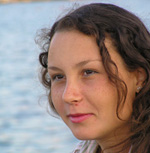 I first recognized Maggie Gee by her book, "Lost Children." It's become one of my favorite novels, having felt some parts of me in its characters. It's about a teenage girl running away from home that reminds the reader of homeless children living on the streets, as well as the emotional "lost child" that probably exists in all of us. I first recognized Maggie Gee by her book, "Lost Children." It's become one of my favorite novels, having felt some parts of me in its characters. It's about a teenage girl running away from home that reminds the reader of homeless children living on the streets, as well as the emotional "lost child" that probably exists in all of us.
As Gee argues, people in their middle ages begin to think over their childhood to see how much the relationship with their parents and their children resemble each other. After her daughter's escape, the mother questions what she did wrong. Her thinking of her mother definitely shows something was also missing in her childhood: "...but I have to make her talk to me. Or at the least, I'll make her listen. Maybe then I could love her properly. Maybe we could be close at last." The book pushes one to contemplate on "how can we understand our parents?"
Having been impressed by the style of her writing and the issues she deals with, this week I want to introduce her other novel, "My Cleaner." It's a satirical novel about the shifting dynamic between a white writer, Vanessa, and a black Ugandan housekeeper, Mary.
For many years Mary was Vanessa's cleaner and also took care of her only child, Justin. Vanessa lives with her so-called beloved son apart from her husband. But Justin, at the age of 22, begins to have a nervous breakdown that his mother can't understand. To his mother's surprise, he wants to see no one but his old nanny. In the past, working as a cleaner, Mary was meek and didn't oppose a low salary. However, she secretly condemned Vanessa for her meanness and neurotic, self-obsessed mannerisms. Her neglect of the child also made Mary anxious. But years later, she seems more like nanny than cleaner and succeeds in helping Justin out of depression. With the interwoven lives of these characters, the book deals with class conflict and racism.
The plot behind these themes also pulled me in. It has a message about familial love and responsibilities. The question 'how to balance home and career at the same time?' comes to mind. I mean that while Vanessa is dealing with her writing, after a certain point she forgets her son. Mary, being a more affectionate, sensitive and humorous mother figure, ends up taking care of Justin. The way Gee depicts how Mary sympathizes with Justin leaves the reader with a poignant image.
Overall, for me the novel was easy to read, exciting and engrossing. Gee's memoir "My Animal Life" has recently been published. Having read her novels with so much delight, I can't wait to get my hands on her autobiography.
BY MÜGE TEKŻN (IE/IV)
tekin_e@ug.bilkent.edu.tr
 |







